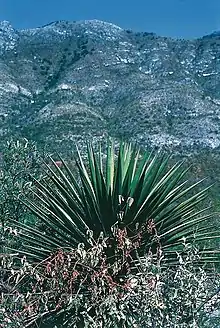Yucca declinata
Yucca declinata is a species of the genus Yucca, family Asparagaceae. It is known only from the vicinity of Bacanora, in the Mexican state of Sonora. Botanist Howard Scott Gentry[1] first collected the species and mentioned it in print, noting the differences between this population and the closely related species Y. grandiflora H. S. Gentry and Y. arizonica McKelvey (sic, = Yucca baccata var. brevifolia L. D. Benson & R. A. Darrow). He did not, however, describe it as a new species. Later examination of his descriptions and his material led to the recognition of this as a new species.[2]
| Sideways yucca | |
|---|---|
 | |
| Scientific classification | |
| Kingdom: | Plantae |
| Clade: | Tracheophytes |
| Clade: | Angiosperms |
| Clade: | Monocots |
| Order: | Asparagales |
| Family: | Asparagaceae |
| Subfamily: | Agavoideae |
| Genus: | Yucca |
| Species: | Y. declinata |
| Binomial name | |
| Yucca declinata | |
The epithet declinata refers to the fact that this is the only known species of Yucca in which the flowering stalk is oriented horizontally. The plant is tree-like up to 6 m tall, branching in the crown and suckering at the base. Leaves are up to 140 cm long, yellowish-green, without teeth. Flowering stalk is up to 130 cm m long, glabrous, usually perpendicular to the main stem. Flowers small, white. Fruit oblong, tapering at base, 15–20 cm long, not splitting apart when ripe. Seeds black, flat, slightly egg-shaped, 1.0-1.5 cm in diameter. The species occurs in open woodlands and scrublands on volcanic and limestone soils.[2]
References
- Gentry, H. S. 1972. The Agave family in Sonora. USDA Agricultural Handbook 399
- Laferrière, Joseph E. (1995). "Yucca declinata: a new species from Sonora". Cactus and Succulent Journal. 67: 347–348.
| Wikimedia Commons has media related to Yucca declinata. |